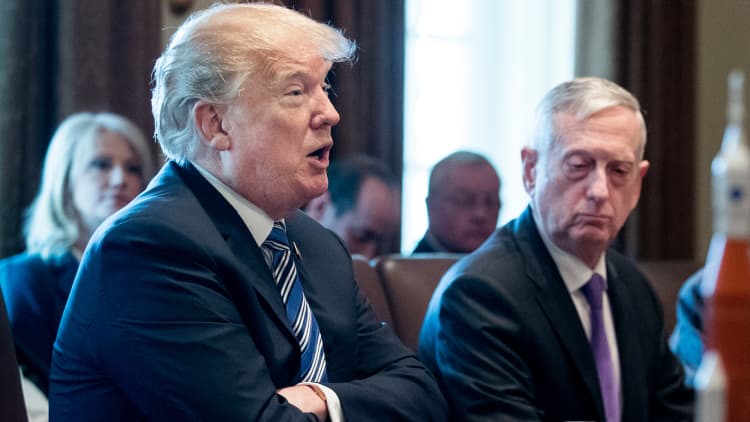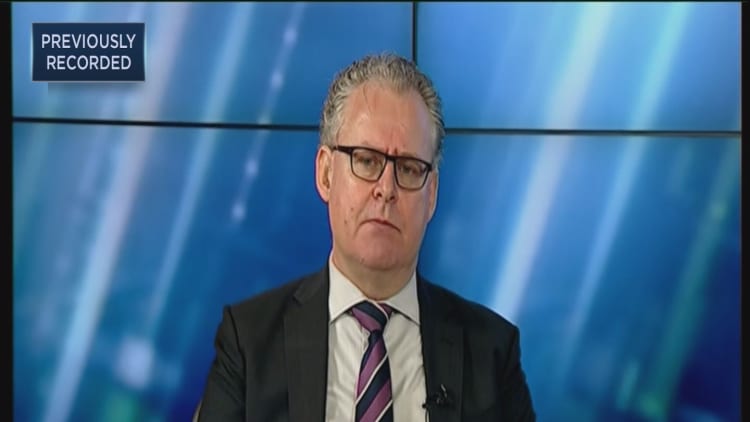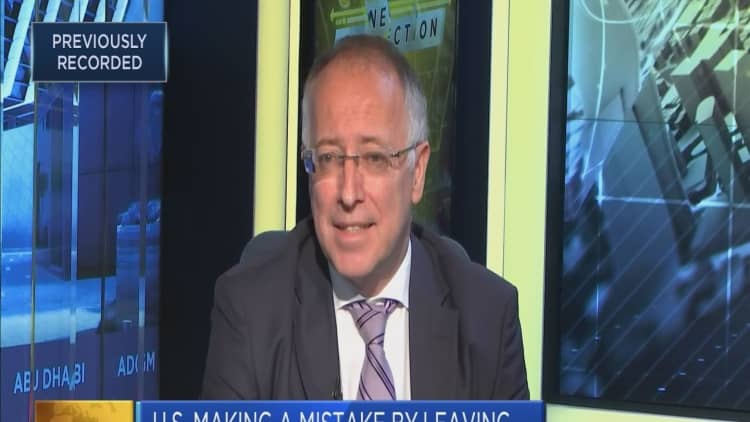
Oil prices gave up their gains on Monday after surging to their highest levels since late 2014, falling from above $70 a barrel after President Donald Trump said he'd announce his decision on the Iran nuclear deal on Tuesday.
The president said he will make an announcement on Tuesday at 2 p.m. ET.
Crude futures were earlier boosted by the latest troubles for Venezuelan oil company PDVSA and the looming decision on whether the United States will re-impose sanctions on Iran.
U.S. West Texas Intermediate crude futures ended Monday's session up $1.01, or 1.5 percent, to $70.77 per barrel, marking the first time since November 2014 that WTI had climbed above $70 per barrel. The contract was last up 5 cents at $69.77.
Brent crude oil futures were up 46 cents at $75.33 a barrel, having ended Monday's session up $1.30, or 1.7 percent, at $76.17 per barrel. The international benchmark also touched their highest level since November 2014.

The widespread expectation that U.S. President Donald Trump will withdraw from the Iranian nuclear pact has supported oil prices lately. Trump has a May 12 deadline to determine whether to extend sanction waivers.
British Foreign Secretary Boris Johnson is in the United States in an effort to convince the Trump administration to stay in the deal.
Iran re-emerged as a major oil exporter in 2016 after international sanctions against it were lifted, and Trump has a May 12 deadline to determine whether to extend sanction waivers.
"The extraterritorial nature of U.S. sanctions, which cover energy, shipbuilding, finance, trade, insurance, etc., means that ... Iran's oil exports could credibly be curtailed by 200,000-300,000 bpd," RBC Capital Markets analyst Helima Croft said in a note.
U.S. oil firm ConocoPhillips has moved to take key Caribbean assets of Venezuela's state-run PDVSA to enforce a $2 billion arbitration award, actions that could further impair PDVSA's declining oil production and exports.
"If ConocoPhillips is successful, then it will limit the revenues PDVSA will have and give them even more problems paying their bills and producing their oil," said Gene McGillian, manager of market research at Tradition in Stamford.
"Venezuela seemed to get support over the last year from Russia and China. So now there's the question of what kind of deal will they have to make in order to get even more support?" McGillian said.

Venezuela's oil output has halved since the early 2000s to 1.5 million barrels per day (bpd), hit by a lack of investment.
Saudi Arabian Energy Minister Khalid al-Falih said he was concerned about possible shortages of spare crude production capacity.
Russian Energy Minister Alexander Novak pledged Russia's 100 percent compliance in May with an OPEC-led pact to reduce production.
But U.S. output has soared by more than a quarter in the past two years to 10.62 million bpd and is likely to rise further this year as energy companies keep drilling.
China's Shanghai crude oil futures, launched in March, broke their dollar-converted record-high, rising as far as $72.54 on Monday.
— CNBC's Tom DiChristopher contributed to this story.

